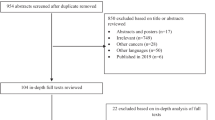Abstract
The purpose of this study was to examine health-related quality of life (HRQL) among women with metastatic breast cancer treated on E2100 with paclitaxel or paclitaxel plus bevacizumab. Trial participants (N = 670) completed the Functional Assessment of Cancer Therapy-Breast (FACT-B) pre-treatment and following 4 and 8 cycles of treatment to assess HRQL and breast cancer-specific concerns. A significantly higher proportion of missing FACT-B assessments was observed among patients receiving paclitaxel only, due to faster time to death. To account for this non-ignorable pattern of missing data, we conducted a survival-adjusted HRQL analysis by jointly modeling the longitudinal HRQL outcome and time to non-ignorable dropout using a two-stage model. FACT scores assessing HRQL did not differ following 4 and 8 cycles of treatment; however mean scores on the 9-item Breast Cancer Scale were significantly higher after 4 and 8 cycles of treatment among patients receiving paclitaxel plus bevacizumab. No differences were observed between treatment arms on FACT-B total scores. The addition of bevacizumab was not associated with additional side effect burden from the patient perspective and was associated with a greater reduction in breast cancer-specific concerns. No other differences were noted.



Similar content being viewed by others
References
American Cancer Society (2007–2008) Breast cancer facts & figures. American Cancer Society, Inc., Atlanta
Miller K, Wang M, Gralow J et al (2007) Paclitaxel plus bevaczumab versus paclitaxel alone for metastatic breast cancer. N Engl J Med 357:2666–2676
Wagner L, Wang M, Miller K et al (2006) Health-related quality of life among patients with metastatic breast cancer receiving paclitaxel versus paclitaxel plus bevacizumab: results from the Eastern Cooperative Oncology Group (ECOG) Study E2100. Breast Cancer Res Treat 100s (suppl): abstr 239
Fitzmaurice GM, Laird NM, Shneyer L (2001) An alternative parameterization of the general linear mixture model for longitudinal data with non-ignorable drop-outs. Stat Med 20:1009–1021
Schluchter MD, Greene T, Beck GJ (2001) Analysis of change in the presence of informative censoring: application to a longitudinal clinical trial of progressive renal disease. Stat Med 20:989–1007
Brady MJ, Cella DF, Mo F et al (1997) Reliability and validity of the Functional Assessment of Cancer Therapy-Breast quality-of-life instrument. J Clin Oncol 15:974–986
Ingham J, Portenoy RK (1998) The measurement of pain and other symptoms. In: Doyle D, Hanks G, MacDonald N (eds) Oxford textbook of palliative medicine. Oxford University Press, Oxford, pp 203–219
Patrick DL, Ferketich SL, Frame PS et al (2003) National Institutes of Health State-of-the-Science Conference Statement: Symptom Management in Cancer: Pain, Depression, and Fatigue, July 15–17, 2002. J Natl Cancer Inst 95:1110–1117
Hahn EA, Cella D, Chassany O et al (2007) Precision of health-related quality-of-life data compared with other clinical measures. Clinical significance consensus meeting group. Mayo Clin Proc 82:1244–1257
Sledge G, Neuberg D, Bernardo P et al (2003) Phase III trial of doxorubicin, paclitaxel, and the combination of doxorubicin and paclitaxel as front-line chemotherapy for metastatic breast cancer: an intergroup trial (E1193). J Clin Oncol 21:588–592
Acknowledgments
This study was supported in part by Public Health Service Grants (Grant numbers CA23318, CA66636, CA21115, CA49883, and CA16116) from the National Cancer Institute, National Institutes of Health, Department of Health and Human Services, and by Genentech, Inc. David Cella, Ph.D. consulting honoraria received research funding from Genentech, Inc. Kathy Miller, M.D. consulting honoraria and speaker’s bureau from Genentech, Inc. No other authors have disclosures to report.
Author information
Authors and Affiliations
Corresponding author
Additional information
This study was conducted for the Eastern Cooperative Oncology Group. Primary analysis of this study was reported in Miller K et al.: New England Journal of Medicine, 2007, 357 (26), 2666–2676.
Rights and permissions
About this article
Cite this article
Cella, D., Wang, M., Wagner, L. et al. Survival-adjusted health-related quality of life (HRQL) among patients with metastatic breast cancer receiving paclitaxel plus bevacizumab versus paclitaxel alone: results from Eastern Cooperative Oncology Group Study 2100 (E2100). Breast Cancer Res Treat 130, 855–861 (2011). https://doi.org/10.1007/s10549-011-1725-6
Received:
Accepted:
Published:
Issue Date:
DOI: https://doi.org/10.1007/s10549-011-1725-6




